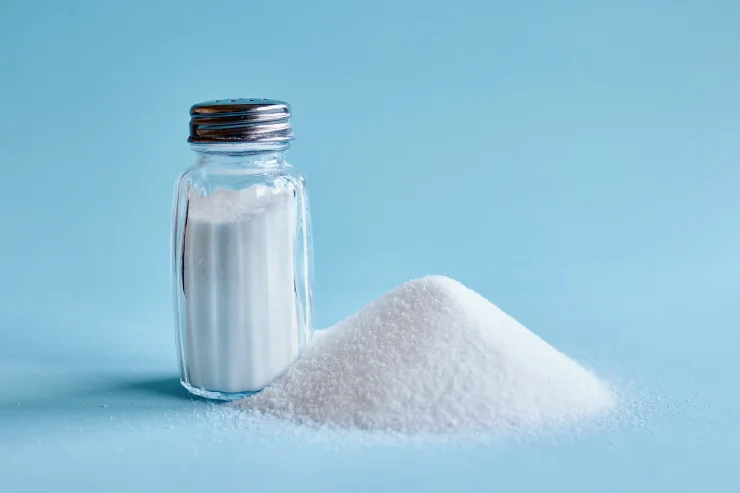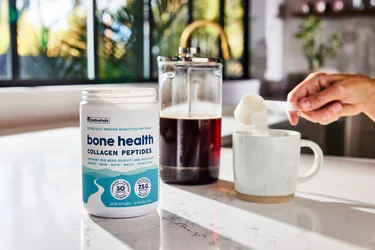Health
The Ultimate Guide to Strong Bones: 5 Foods to Avoid (Plus the One Nutrient You Need)
October 20, 2023
Poor bone health has become somewhat of an epidemic—the National Osteoporosis Foundation reports that around 54 million Americans have poor bone density. This staggering statistic is the cause of millions of serious accidents, fractures, and falls that can completely take away one’s independence.
Don’t worry—this is completely natural. The strength and density of your bones naturally decreases with age. This is because they lose calcium, collagen, and other essential minerals over time, making them more weak and brittle.
And unfortunately, eating the wrong foods can make this problem even worse.
So what can you do?
We went to Dr. Chad Walding, Doctor of Physical Therapy and leading Senior Nutrition Expert, for answers. He compiled a list of five bad-to-the-bone foods that ruin your bone health—and which key nutrients you should consume instead.
Table Of Contents
5 Sneaky Foods That Weaken Your Bones
Here’s a look at a few of the most common dietary culprits that can damage your bones…
1. Carbonated Drinks

Carbonated drinks are packed with phosphoric acid, which causes an increase in the blood's acidity levels (1). As a result, the body pulls calcium out of our bones in order to bring the acidity levels back to normal.
Dr. Chad Walding, Doctor of Physical Therapy and leading Senior Nutrition Expert explains, “When calcium intake is low, consuming excessive amounts of phosphoric acid will promote rapid calcium loss from the body”.
Since nearly all soft drinks lack calcium and increase calcium excretion in your urine, it's easy to see how they act as a double whammy for bone health, putting you at serious risk for developing bone conditions like osteoporosis.
2. Table Salt

While sodium plays an important role in our overall health, over-consuming table salt or eating excessive amounts of high-sodium foods can pose a great obstacle to a sturdy skeleton.
The Dietary Guidelines for Americans recommends that adults consume no more than 2,300 milligram of salt per day. However, on average Americans consume more than 3,400 milligrams of sodium each day (2, 3).
"Generally speaking, for every 2,300 milligrams of sodium we take in, about 40 milligrams of calcium is lost in the urine," says Dr. Walding.
Postmenopausal women are at an even greater risk. Research has found that postmenopausal women with a high-salt diet lose more bone minerals than other women of the same age (4).
For maximum bone health, Dr. Walding recommends keeping salt intake below 2,300 milligrams a day and swapping table salt for pink Himalayan sea salt. Pink Himalayan salt has up to 84 other minerals and trace elements–including potent doses of common minerals like potassium and calcium which help maintain the vital mineral balance needed for healthy bones.
3. Excessive Caffeine

When ingested excessively, caffeine (from soda, coffee, or other caffeinated drinks) can begin leaching calcium from your bones (5, 6). This is a particular problem if you don't get enough calcium each day to begin with.
One 16-ounce cup of coffee can provide 320 milligrams of caffeine, exceeding the daily recommended amount when it comes to supporting strong, healthy bones. "On average, we can lose up to 6 milligrams of calcium for every 100 milligrams of caffeine we consume," says Dr. Walding. That's not as much of a loss as salt, but it's worrisome, nonetheless.
Limiting caffeine intake to 300 milligrams a day (while consuming the appropriate amount of bone-rebuilding nutrients) can help offset the losses caused by excessive caffeine intake. Coffee lovers may also find it helpful to gradually reduce their caffeine intake by drinking half regular and half-decaf coffee.
4. Hydrogenated Oils

Hydrogenated oils are man-made fats produced by contaminating vegetable oils with hydrogen gas under super-high pressure—which creates synthetic artery-blocking trans fats. This man-made form of trans fat is not to be confused with the naturally occurring trans fats found in animal products and coconut oil. Naturally occurring trans fats are proven to support our health where the synthetic version can do serious damage.
The synthetic processing used to create hydrogenated oil destroys any naturally-occurring vitamin K in the vegetable oils. Vitamin K is essential for strong bones. So much so thatexperts recommend forgoing any foods that contain non-natural trans fats (think: fast food, frozen food, pastries, and most store-bought coffee creamers).
Note: Even if the label says trans-fat-free, check the ingredient list for any "hydrogenated oils" or "partially hydrogenated oils." Those phrases are synonyms for synthetic trans fats snuck into your food.
5. Wheat Bran

Wheat bran contains high levels of phytates which can prevent the body from absorbing calcium. In fact, 100% wheat bran is the only food that appears to reduce the absorption of calcium in other foods eaten at the same time (7).
For example, when eating 100% wheat bran cereal with fortified milk, your body's ability to absorb calcium from the milk is drastically reduced. Dr. Walding recommends cereal and bread lovers to switch from wheat bran products to sprouted grain products instead. The sprouting process breaks down phytates, which makes nutrients like magnesium, B vitamins, andnutrients from companion foods (like the calcium from fortified milk) easier to absorb.
The sprouting process also breaks down some of the starch found in whole wheat bran grains, which makes them a little easier to digest. Sprouted grain products are the preferred alternative not just for bones, but for overall health and wellbeing.
Now that you know the five bone-dissolving foods to avoid, what should you add to your diet instead? There’s one supplement, in particular…
The Best Supplement for Bone Health
While avoiding bone-damaging foods will certainly help keep bones healthy, there is one stand-out dietary habit that researchers believe yields the greatest impact on your ability to rebuild and strengthen bone tissue: collagen peptides.
What Is Collagen?
Collagen is the most abundant protein in your body. In fact, approximately 90% of the bone matrix is composed of collagen protein (8). It is responsible for several biological functions, one of which is to provide structural support to connective tissues like muscles, joints, skin, and bones.
"Collagen protein is the primary substance that makes up our bone’s solid material, providing the bone density needed to maintain a stronger skeletal structure within the body," Dr. Walding says.
Most Americans get plenty of protein, but many fail to get enough collagen and it's hurting their bones. Studies show that low intake of protein decreases calcium absorption and may also affect rates of bone formation and breakdown (9).
During your 20’s, your body’s natural ability to produce adequate levels of collagen begins to wane by about 1-2% each passing year (10). By the age of 40, the body’s ability to produce collagen decreases by 25%. By age 60, it has decreased by over 50% (11).
And if your collagen levels are left unaddressed, your risk of injury increases with each passing year.
“The first step to restoring bone density and preventing injuries and fractures is to restore your collagen deficit. Rebuilding collagen levels back to optimal ranges is the key to strong healthy bones at any age,” says Dr. Walding.

Stronger Bones With Just 1 Scoop
NativePath Bone Health Collagen contains our proprietary and clinically-proven Bioactive Collagen Peptides FORTIBONE® and VERISOL® for strong bones and healthy joints, skin, hair, and nails.
3 Ways Collagen Promotes Bone Health
Collagen maintains bone health in three important ways…
1. Prevents Bone Loss
Collagen gives your bones structure and helps keep them strong. As collagen levels deteriorate with age, bone mass does too. This leads to crippling mobility concerns,severely low bone density, and higher risks of bone fractures.
Studies show that taking collagen supplements may have certain effects in the body that help inhibit bone breakdown (12).
2. Relieves Joint Pain
Collagen helps maintain the strength of connective tissues likejoints, muscles, and cartilage (the rubber-like tissue that protects your joints). As the body’s collagen levels decrease with age, the risk of developing degenerative joint disorders increases.
Some studies have shown that taking a collagen supplement may help improve symptoms of joint disorders and reduce joint pain overall (13).
3. Strengthens Muscles
Between 1 and 10% of muscle tissue is composed of collagen. This means that collagen protein is vital for keeping your muscles strong and functioning properly as you age.
Studies suggest that collagen supplements help boost muscle mass in people with sarcopenia, the loss of muscle mass that happens with age (14).
So, How Much Collagen Do You Need?
The amount of collagen you need is based on YOUR body. It varies depending on your age, activity level, degree of pain, and more (15).
That said, there are some general guidelines you can follow to start feeling a difference. Here are some recommendations, based on one’s desired effect…
5-10 grams of collagen per day
- Increases glycine production
- Increases proline production
10-20 grams of collagen per day
- Increases energy
- Promotes a healthy weight
- Reduces inflammation
- Promotes gut health
- Improves digestion
- Promotes healthier hair, skin, and nails
20-40 grams of collagen per day
- Promotes whole-body healing
- Increases bone density
- Promotes joint health
- Replenishes cells
- Repairs digestive lining
- Promotes weight loss
- Builds muscle

Stronger Bones With Just 1 Scoop
NativePath Bone Health Collagen contains our proprietary and clinically-proven Bioactive Collagen Peptides FORTIBONE® and VERISOL® for strong bones and healthy joints, skin, hair, and nails.
The Best Collagen Supplement for Bones
Though it’s possible to get extra collagen through your diet (consuming animal products like bone broth, poultry skin, and cartilage on bones), it can be unappealing or difficult to eat enough to support your body’s requirements (16, 17).
That’s why supplementing with a high-quality collagen powder has become the preferred method for increasing collagen levels within the body.
However, not all collagen supplements are created equal. Which is why there are three things you want to look for on a collagen label...
3 Things to Look for in a Collagen Supplement
Based on recent clinical trials, there are 3 keys to getting the absolute best results with collagen supplementation (18).
1. Avoid “Multi-Collagen” Marketing Scams
Did you know that there are 28 distinct varieties of collagen (19)? However, the most abundantly found and thoroughly researched are types 1 and 3 collagen.
Types 1 and 3 are the most beneficial types of collagen to support healthy skin, hair, and nails, while effectively boosting muscle, ligaments, and tendons (20).
But here’s the thing: several collagen brands sell “muli-collagen” supplements. This means that there are several types of collagen in a single jar.
While multi-collagen supplements tend to be less expensive, there are a few key reasons why choosing bargain brand multi-collagens may not be the smartest option for meeting your daily collagen needs.
Research indicates that certain collagen types should be taken together while others should be taken separately.
For example, because type 2 collagen makes up the fluids and functions in the cartilage and joints, type 2 collagen supplements should be taken separately from types 1 and 3 to ensure adequate absorption (21, 22).
So in order to experience maximum results with collagen supplementation, use a powder that combines only types 1 and 3.
2. Certified Grass-Fed & Non-GMO
Bovine collagen, chicken collagen, marine collagen… With so many options to choose from–what’s the best one for you?
Collagen that comes from grass-fed and antibiotic-free cows will have a direct impact on the absorption, effectiveness, and safety of the supplement.
Grass-fed cows are never fed any genetically modified organisms and are not exposed to growth hormone treatment (rBGH & rBST), chemicals, antibiotics, or injected pathogens (23). This makes grass-fed collagen one of the healthiest (and safest) protein supplements to include in your diet. It is free of hormones, antibiotics, pesticides, and steroids.
To avoid these potential contaminants in your bovine collagen supplement, always look for “grass-fed” along with “non-GMO” on the label.
3. “Hydrolysate”, “Hydrolyzed”, or “Peptides” on the Label
To ensure your body can easily digest and put the collagen to immediate use, make sure the supplement is fully hydrolyzed collagen.
When hydrolyzed, collagen is carefully reduced to smaller, more digestible peptides during the manufacturing process. This means your body will be able to start reaping the age-defying benefits much more rapidly.
Properly hydrolyzed collagen peptides are available in the bloodstream within two hours of ingestion—usually within only one hour.

Stronger Bones With Just 1 Scoop
NativePath Bone Health Collagen contains our proprietary and clinically-proven Bioactive Collagen Peptides FORTIBONE® and VERISOL® for strong bones and healthy joints, skin, hair, and nails.
The Bottom Line
Maintaining your bone health becomes vitally important as you age. And what you eat plays a huge factor. Certain foods like carbonated drinks, table salt, caffeine, hydrogenated oils, and even wheat bran can draw vital nutrients away from your bones. Thankfully, there are simple ways you can protect your bones. Taking a high-quality collagen supplement is one of them. When you supplement with collagen, you’re replenishing the collagen you’ve lost over the years. This helps fill in wrinkles, wipe away joint pain, strengthen hair and nails, and of course—improve bone health.
To start restoring the strength of your bones, take 3 to 4 scoops (30-40 grams) of grass-fed collagen peptides for 8 weeks. Then decrease your supplementation to 2 scoops (20 grams) daily, indefinitely. You’ll be well on your way to better bone health—just wait until your next DEXA scan!
Frequently Asked Questions
- Collagen enhances skin complexion and reduces wrinkles.
- Collagen improves hair health and slows follicle thinning.
- Collagen promotes heart and artery health.
Kate Aseltine
Kate Aseltine
NativePath has strict sourcing guidelines and relies on peer-reviewed studies, academic research institutions, and medical associations. We avoid using tertiary references.
Medical Disclaimer
This content is for informational and educational purposes only. It is not intended to provide medical advice or to take the place of such advice or treatment from a personal physician. All readers/viewers of this content are advised to consult their doctors or qualified health professionals regarding specific health questions. Neither Dr. Chad Walding nor the publisher of this content takes responsibility for possible health consequences of any person or persons reading or following the information in this educational content. All viewers of this content, especially those taking prescription or over-the-counter medications, should consult their physicians before beginning any nutrition, supplement, or lifestyle program.



